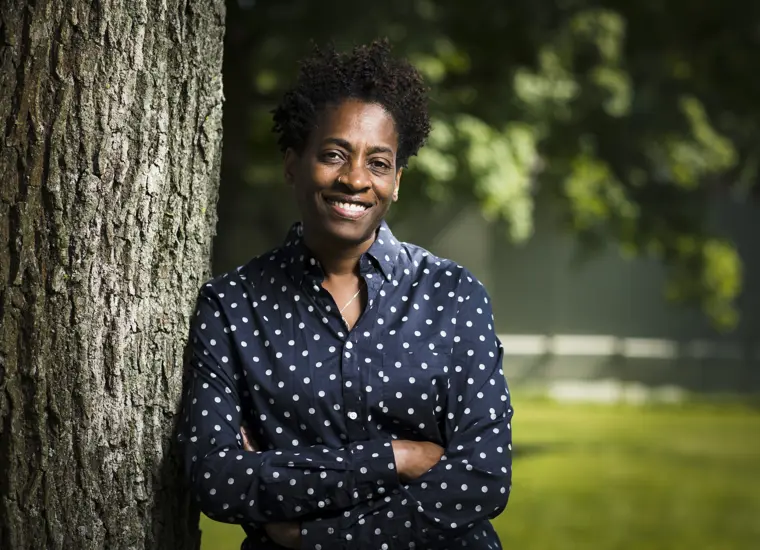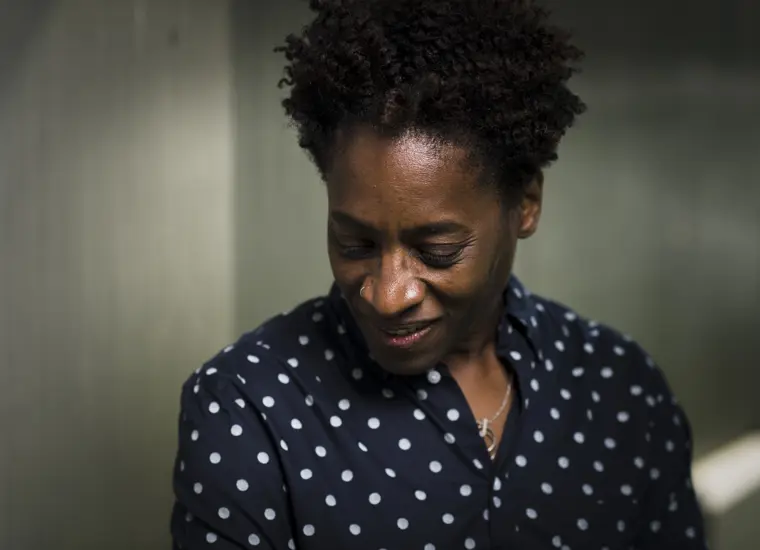Tacktalet
Här kan du ta del av Jacqueline Woodsons tacktal från prisutdelningen 2018.
“Each kindness makes the whole world, a little bit better.”
That line is from a book I wrote many years ago. But this week, again and again, I was reminded of what first inspired me to write it.
There is a kindness here in Sweden. I learned this over the past week – my first time in this country. As I visited the young people at schools in Stockholm and Vimmerby, as I sat down with journalists, had fikka with artists and illustrators, ate really good pizza with the amazing ALMA jury in Astrid Lindgren’s Stockholm apartment, drank wine with Black and Latinx and Persian young Swedes, sat in public conversations with academics and middle school teachers, drove the roads of this country with my patient and kind driver Gert, laughed with my amazingly wonderful taskmasters, Helen and Mariella, ate lunch with relatives and friends of Astrid’s in her childhood home, dinner with more relatives and friends at Astrid Lindgren’s World, received hugs and flowers and books and paintings from children and grown ups … what I felt again and again was the deep kindness of a country and of a people.
Sometimes you don’t know how much you’ve missed a thing until it returns to you.
In the U.S. we’ve been living beneath a cloud so thick and gray with unkindness that some days it feels like a long winter has taken up permanent residence. And I don’t mind North American winters, really. (And I won’t even complain about them here in Sweden!) Winters give one a chance to rest, to slow down, to plan for springtime, to gain perspective. So I like to think that is what’s happening. As young people lead the resistance, I am seeing a country at the fiery stages of fear and rebirth. Just like with the Civil Rights movement of the 1960s, I am seeing people lose their lives, and march and fight and speak out against hate. And it is scary. And it is hard. And it is exhausting. But more than all of those things – it is necessary. To get to kindness, to get to safety for ALL people, we must first and foremost not be afraid speak out against a country’s wrongdoings.
And above you notice I write the word ‘gray’ to describe the time we are living in in the US. I do not write “It is a dark time” or “It is a black time.” As a child – every time I saw words like dark or black being used to describe something negative, I winced. I am dark. I am black. Why should who I am be negative? It is something we must think about always – whether we are writers or not – What are the words we’re using and how are we using them? Who do our words hurt and who do they heal? As a writer, I not only think about language but about the many, many people who will read my words and what mirrors of themselves they will see in those words. I never want a young person walking away from my work feeling lesser than or wrong. I never want a young person to see the color of their skin used to refer to something evil.
So yes, in the US and in so much of the world – as right wing groups fight to gain power, as Civil Rights laws get repealed, as women’s bodies and brown bodies and immigrant bodies are constantly threatened, as unjust laws once again separate brown children from their parents – first via Enslavement then via Mass Incarceration and now via deportation laws – let us keep remembering, that like every great children’s book ever written, you can’t have sadness without hope. There must always be a brightness at the center of that which feels so difficult. And with that which is difficult, comes a call to action. Tonight is a glorious evening and I am so grateful to be here. But tomorrow – it’s back to work.
As I moved through this country this week, again and again, I was reminded that first and foremost, we must remain kind. That kindness – the kindness of family and friends and strangers, has gotten so many of us through hard times.
When the phone rang in the very, very early morning in March, my partner and I didn’t hear it (thankfully). It was on another floor in our house and even our hyper-vigilant dogs slept through it. When it rang again, maybe someone stirred, dreaming of a phone ringing somewhere. But when it rang the third time, my partner was up – It was around 6am and hearing her speaking into it, I jumped up. A phone ringing at the crack of dawn is rarely good news. I quickly went through my mind asking the questions Who had been sick? Were both children at home? Had anyone we’d known taken a car trip in the middle of the night…?
Juliet, my partner, on the other hand, thought it was our daughter – calling from two floors up to ask us to turn the heat up. The thermostat is on our floor and in the old months, we get this call often. You may ask, well, why doesn’t your child just walk down the stairs and turn the heat up herself? But if you’re asking that question, you are not a parent to a teenager.
But when Juliet handed the phone to me and an accented voice asked “Is this Jacqueline Woodson?” I exhaled. No tragedy. Tragedy didn’t come via the name Jacqueline Woodson. And as my half-asleep brain raced around wondering what or who or why, the voice said –This is Helen Siegeland, I’m calling from Bologna to let you know you’re this year’s recipient of the Astrid Lindgren Award. Of course I’m probably paraphrasing this because remember – the half asleep thing. Then she asked I knew about this prize. What came to mind was Pippi Longstocking. I think this is what comes to most American Minds. I knew there was an award. I know that some people had won it. I didn’t know though that I was even in the running for it – It’s been a bit of a crazy year in the US. But of course I had heard of the award. I didn’t tell Helen that as I was talking to her, I was going upstairs to my computer to google “Astrid Lindgren Award.” And then, I think I probably used an American colloquialism that I won’t repeat on this stage.
Then for the next three hours as the information sank in, I answered call after call after call from the Swedish press. Slowly, maybe over a period of weeks, I became the Astrid Lindgren Memorial Award Laureate. And for this, I say thank you – to the amazing jury that chose me, to the people of Sweden who have been so kind, to the Crown Princess who is presenting me with this honor, to the Minister of Democracy and Culture, to my family – who trekked all the way from New York City to share this moment with me, to Astrid Lindgren for her own deep respect of young people and the value of their narratives. But mostly I say thank you to the young people themselves, who each day give me a reason to keep on writing. Who through their own strength, bravery and perseverance, show me the importance of the work I’m doing – and all of the work, I still have left to do. Thank you.

